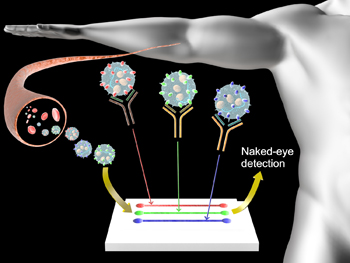Nanoshearing Devices for Exosome Detection

Project Keywords
Cancer Diagnostics, Exosomes, Electrohydrodynamics, Microfluidics.
Project Summary
With health expenditure continuing to rise ($4.5 billion in direct health system costs within Australia), there is an urgent need for new biomarkers and technologies to personalise cancer treatment and to make treatments more effective. Further, it is also important that effective molecular screening technologies for early detection of biomarkers be employed to improve patient survival. One biomarker with excellent potential is the presence of exosomes in body fluids such as blood, urine and saliva, which has been shown to carry molecular information representative of the parent cell or tumour. Unlike other blood-based markers such as circulating tumor cells (1-100 cells/mL of blood), exosomes are generally present in large numbers in body fluids and represent a simple and non-invasive source of actually profiling blood, that may potentially correlate with the tumour. Recently, we discovered a physical phenomenon referred to as tunable “nanoshearing”, which allows exquisite control of nanoscopic fluid flow engendered within a nanometers of an electrode surface and provides a new capability to physically capture and/or displace non-specifically bound species. This project will employ this newly discovered phenomenon to specifically isolate, detect, and characterise exosomes in cancer patients. This translational-focused interdisciplinary project combines the latest developments in microfludics platform and cellular/molecular genetics with cutting edge nanobiotechnology and will provide an opportunity for students to acquire diverse skills in engineering, chemistry, molecular biology and bioengineering.
Project Contacts
| Lead Investigator | Dr Muhammad J. A. Shiddiky; Prof Matt Trau |
| Lead Investigator Web Address | http://www.aibn.uq.edu.au/muhammad-shiddiky |
| Research Group | Trau Group |
| Contact email | m.shiddiky@uq.edu.au |
